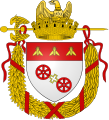Bonne ville de l'Empire français
Bonne ville de l'Empire français ( French , Good City of the French Empire ) was an honorary title of selected cities of the First French Empire of Napoleon I.
The title was introduced by the Constitution of 1804 ; Article 52 stipulated that every emperor had to obey the throne in the presence of the leading dignitaries of the empire, among them the maires of the 36 bonnes villes, within a specified period of time after the accession to the throne .
An imperial decree of June 22, 1804 stipulated which 36 most important cities in France were to be granted bonne ville status:
- in brackets: French names or old spellings that differ from today's official name -
- Aachen (Aix-la-Chapelle)
- Alessandria (Alexandrie)
- Amiens
- Angers
- Besançon
- Bourges
- Bordeaux
- Brussels (Bruxelles)
- Caen
- Clermont
- Dijon
- Geneva (Genève)
- Gent (Gand)
- Genoa (Gênes)
- Grenoble
- La Rochelle
- Lille
- Liège (Liège, Liége)
- Lyon
- Mainz (Mayence)
- Marseille
- Metz
- Montpellier
- Nancy
- Nantes
- Nice (Nice)
- Orleans
- Paris
- Rennes
- Reims
- Rouen
- Strasbourg (Strasbourg)
- Toulouse
- Tours
- Turin
- Versailles
Mainz coat of arms 1809–1813 , splendid version
Bremen coat of arms 1811–1813
The expansion of the French national territory in the following years led to 16 additional cities receiving the title of bonne ville , such as Lübeck , Hamburg and Bremen , which were incorporated into the Empire on January 1, 1811. The cities newly added to the series of bonnes villes at this time included:
- Amsterdam , since 1810
- Antwerp (Anvers) , since 1808
- Bremen (Brême) , since 1811
- The Hague (La Haye) , since 1812
- Florence (Florence) , since 1812
- Hamburg (Hambourg) , since 1811
- Köln (Cologne) , since 1812
- Livorno (Livourne) , since 1812
- Lübeck (Lubeck) , since 1811
- Montauban , since 1811
- Nîmes (Nismes) , since 1812
- Parma (Parme,) , since 1812
- Piacenza (Plaisance) , since 1812
- Rotterdam , since 1810
- Troyes , since 1811
The cities raised to bonnes villes were given coats of arms , which were designed based on the traditional coats of arms of the Conseil du Sceau and awarded by means of imperial coats of arms . The common element of the coats of arms of all bonnes villes was a red shield head with three golden imperial bees . (→ Napoleonic heraldry )
A decree issued on May 17, 1809 stipulated both that the maires of the bonnes villes automatically received the title of baron after ten years of service , and that they ranked immediately behind the senators in terms of protocol .
literature
- Jean Tulard (Ed.): Dictionnaire Napoléon. Fayard, Paris 1999, ISBN 2-213-60485-1 .


